Have you been looking for information and facts about Steps to Cleaning Your Sump Pump Properly?

Sump pumps are critical elements in several homes, particularly in locations vulnerable to flooding or extreme dampness. They help prevent water damages by successfully removing excess water from basements or crawl spaces. However, like any other home appliance, sump pumps need regular maintenance to ensure they function properly when needed the most. Cleansing your sump pump is a crucial part of its maintenance, and comprehending just how to do it correctly can save you from costly fixings and potential disasters.
Intro
Keeping a clean sump pump is vital for its proper performance and longevity. Disregarding this vital job can cause obstructions, malfunctions, and inevitably, water damage to your residential or commercial property. Therefore, learning exactly how to cleanse a sump pump is important for house owners that depend on these gadgets to maintain their cellars dry and safeguarded.
Recognizing the Sump Pump
Before diving into the cleansing procedure, it's vital to have a standard understanding of just how a sump pump works. Generally installed in a pit or container below the basement flooring, a sump pump includes several vital parts, including a pump, a float button, and a discharge pipeline. When water builds up in the pit, the float button triggers the pump, which after that pumps the water out via the discharge pipeline, far from the structure's foundation.
Indications of a Dirty Sump Pump
Recognizing when your sump pump needs cleansing is vital for protecting against potential malfunctions. Some typical indications that indicate a filthy sump pump include weird noises throughout procedure, minimized water circulation, and visible debris in the pit. If you observe any one of these symptoms, it's necessary to cleanse your sump pump immediately to avoid any kind of additional concerns.
Planning for Cleaning
Before you start cleansing your sump pump, it's important to take some safety precautions. Start by turning off the power to the pump to prevent any type of electrical mishaps. Furthermore, use suitable protective gear, such as gloves and safety glasses, to shield on your own from dust, debris, and prospective pathogens.
Detailed Overview to Cleaning Up a Sump Pump
Shutting Off the Power
Begin by separating the power supply to the sump pump to stop any type of accidents while cleansing.
Removing Particles and Dirt
Use a pail or a scoop to get rid of any noticeable debris, dust, or sediment from the sump pit. Dispose of the debris correctly to stop it from obstructing the pump or the discharge pipeline.
Cleaning the Pump and Float Switch Over
When the pit is free from debris, meticulously eliminate the pump from the pit. Examine the pump and the float button for any signs of damages or wear. Use a soft brush or fabric to clean the surface areas and get rid of any built up crud.
Flushing the System
After cleaning the pump and float switch, purge the sump pit with clean water to remove any type of continuing to be dirt or debris. This will assist guarantee that the pump operates smoothly and effectively.
Checking for Proper Performance
Before reinstalling the pump, execute a fast test to ensure that the float switch activates the pump appropriately. Pour some water into the sump pit and observe the pump's operation. If everything is working properly, you can rebuild the pump and reconnect the power supply.
Upkeep Tips to Keep Your Sump Pump Clean
In addition to routine cleaning, there are numerous maintenance pointers you can follow to keep your sump pump in ideal condition:
Final thought
Cleansing your sump pump is an essential element of its maintenance and ensures that it runs efficiently when you need it the most. By complying with the actions outlined in this overview and integrating routine maintenance into your routine, you can expand the life expectancy of your sump pump and secure your home from water damage.
How To Inspect And Clean A Sump Pump
There are a few things you may want to look for when inspecting your sump pump. These include:
Leaks: If you notice any leaks around the sump pump, it likely needs to be repaired or replaced. Mud or Water: If there is any mud or water around the sump pump, it’s likely that it’s not working properly and needs to be cleaned. Noises: If you hear any strange noises coming from the sump pump, it may be indicative of a problem. Next, you’ll need to clean the sump pump. If you notice any of these issues, it’s best to clean the sump pump as soon as possible. To do this, you’ll need to remove the pump from its housing. Be sure to have a bucket handy to catch any water that may spill out. Once the pump is removed, use a brush or a spray nozzle to clean off all of the mud and debris. You may also want to check the impeller for damage or wear and tear. If you find any damage, you’ll need to replace the pump.
Once the pump is clean, reattach it to its housing and replace any parts that were removed. Be sure to test the pump before putting everything back in place. Once everything is back in order, put the cover back on the sump pit and refill it with water.
https://elekplumbing.com/blog/how-to-inspect-and-clean-a-sump-pump/

Hopefully you enjoyed our part on . Thank you for taking a few minutes to read our article. So long as you appreciated our post if you please do not forget to share it. I love reading our article about How To Effectively Clean A Sump Pump.
At This Website